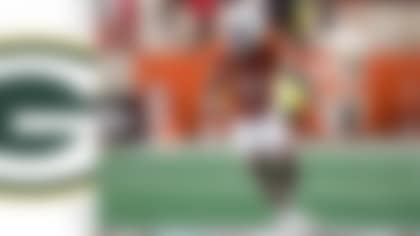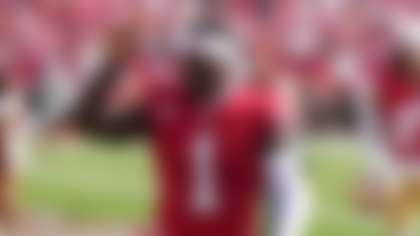FOXBOROUGH, Mass. -- Maybe Peyton Manning hadn't heard Patriots fans chanting "Bra-dy's bet-ter" late in the fourth quarter while he sat on the bench in the cold. He almost certainly wouldn't have cared even if he had, although he did glare into the crowd when a cup came hurtling his way as he left the field. For this night, at least, Manning might have agreed with the partisans' assessment. Manning is famously self-critical and attuned to the nuances of his game, as meticulous in his self-scouting as he is in coordinating his orange tie with his Broncos-blue suit. But his critique of himself Sunday night, after the Denver Broncos were dominated by the Patriots, 43-21, was even blunter than the New England crowd's.
"If the quarterback stinks, you're usually not going to win many games," Manning said.
When it was pointed out to Manning that it was hard to remember him ever saying he stunk, he replied: "I don't usually stink, but I stunk today."
There are, perhaps, 27 teams who would be happy to take their chances with a quarterback who stinks the way Manning stunk Sunday (34 of 57 for 438 yards, two touchdowns, two interceptions), but no matter. Manning, in his unemotional way, beat himself up over this loss, at least in public, more bluntly than he has over any other in memory, including the blowout at the hands of the Seattle Seahawks in Super Bowl XLVIII.
That loss wasn't all Manning's fault, and neither was this one, although this was certainly the worst Manning has looked since, with the Broncos scoring just seven first-half points. But both games exposed frailties that Manning and his offense previously had been able to cover for. On Sunday, Manning called his offense "pretty dead average" and said he, himself, was very below average.
Maybe. But it wasn't Manning's job to stop the "Yo Soy Fiesta" locomotive that is Rob Gronkowski or the human pinball that is Julian Edelman. Or to get pressure on Tom Brady. It was plain on Sunday night that the people charged with those tasks, on a defense that drew so much attention and money in the offseason precisely to avoid these outcomes, weren't up to the job, either, so Manning might as well pile their misery onto his own.
The result was a mood as starkly different as the outcome. For the Patriots, who seemed on the edge of their own abyss a month ago, there was the kind of generosity of spirit that comes with winning. There was talk about team chemistry and measuring only themselves, and ruminating on plans for the bye week and easy laughter at reminders of how bleak things looked after that pounding by the Kansas City Chiefs that set off speculation about Brady's future. And for the Broncos, there was disgust so fresh it was hard to even complete a question to Manning about a second-quarter interception that typified how the Patriots approached defending -- by New England DE Rob Ninkovich, who had dropped into coverage -- before he cut it off with some biting commentary.
"Bad play, bad play," Manning said of the interception, on which Ninkovich cut in front of Manning's intended target, Demaryius Thomas, on a crossing route in the middle of the field. Manning, it seemed, never saw Ninkovich drop. "I thought that was a critical play. We didn't recover as well as we would have liked, so they got a touchdown out of that. Just a bad, bad decision and certainly at a bad time. Certainly a play I'd like to have back -- really bad decision by me."
The truth is that neither quarterback was extraordinary Sunday, although Brady was certainly better. The 16th installment of this generation's greatest rivalry produced something closer to a dud that turned early on Broncos mistakes and never rose to the level of the "Anything you can do, I can do better" thrillers that have helped determine so many seasons before. The quarterbacks combined for 110 passing attempts, 771 yards and six touchdowns, but that only tells you how hollow statistics can sometimes be. The best plays of the night were made, instead, by Edelman on a punt return and Gronkowski on an absurd, one-handed, twisting, leaping reception; by a defense that managed to pressure and confuse Manning without Chandler Jones; and by both Patriots lines, which simply manhandled a Broncos team built to be tougher this season.
The most impressive player on the field -- and the one whose availability might determine who wins a seemingly inevitable playoff rematch in January -- was Gronkowski. His five-game surge has coincided with Brady's resurgence and the Patriots' current winning streak, underscoring not just his importance among a relatively faceless receiving corps but the constant question of how many more titles New England might have if his body hadn't broken down in the past. He's caught 18 passes in the past two games alone, and for all the time John Elway spent toughening up his defense, the unit had no solution for the massive target who sent more diminutive defenders flying out of his path like so many cartoon villains.
The Broncos entered this game as the best, most complete team in the NFL and exited having ceded that description to the Patriots. Suddenly, the Broncos are playing catch-up to them in the race for home-field advantage in the AFC. Brady correctly pointed out that Denver will wind up with a very good record. And the rest of the schedule favors the Broncos -- the Patriots still have road games at Indianapolis, Green Bay and San Diego, and home games against the Lions and Dolphins. But because the Patriots now hold the tiebreaker, the Broncos must finish with a better record than New England. Considering how hot the Patriots have been since their dismantling by the Chiefs -- Brady has thrown 18 touchdowns and one interception over the past five weeks -- it is nearly impossible to picture the playoffs without a deep run from them.
But after Sunday, the AFC has 11 teams with at least five victories, the most through nine weeks in conference history -- an unexpected show of power. Last year, a regular-season overtime victory by the Patriots over the Broncos wound up meaning very little -- Denver won home-field advantage anyway, using it to dismiss the Gronk-less Patriots in the AFC Championship Game. Maybe that will be the same outcome this year, too. But with such a vast field nipping at their heels, both the Patriots and Broncos have to be concerned about whatever flaws they have, and right now it is the Broncos who seem to have more of them. That is where Manning might not have been overstating things Sunday night. He noted that Denver could not recover after the Ninkovich interception, a troubling reality that seems exclusive to their games against New England. Mistakes pile up, so do the points, and while they are able to vanquish almost every other contender, the Broncos suddenly find themselves in an unfamiliar spot -- looking up at someone else in the AFC.
When Manning was done Sunday night, he walked toward the Broncos bus with his head down and his hands in his pockets, resigned to a surprisingly bad showing against the very type of team Denver was built to beat. There is a good chance the Broncos will have to come back here in January, but first the work of removing the stink -- from himself, but also from a shredded secondary and a missing pass rush and an overwhelmed offensive line -- begins.
"I think it doesn't matter who you were playing. If I played the way I did today and we got beat like we did today, I'd like to think I would be just as disappointed, so I don't really feel it's more because it's one particular team, I guess," Manning said. "It's your job to execute and perform, and that's what I expect to do myself. And when I don't, I'm disappointed. So I'm going to do my job better, no matter who we're playing. So hopefully we can do that starting next week."
Follow Judy Battista on Twitter @judybattista.












